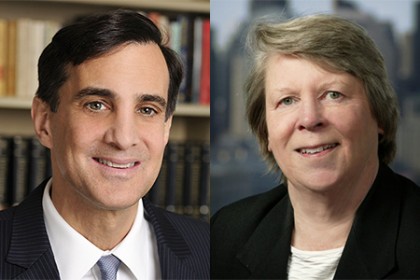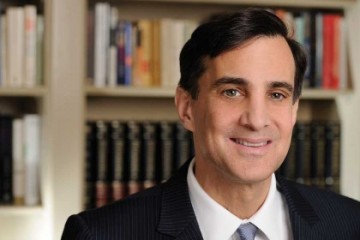Ronald J. Daniels, president of Johns Hopkins University, and Diane Griffin, a distinguished professor of molecular microbiology and immunology in the university's Bloomberg School of Public Health, are among 35 scholars elected to the 2018 class of the American Philosophical Society.
The American Philosophical Society is the oldest learned society in the U.S., founded in 1743 by Benjamin Franklin for the purpose of "promoting useful knowledge." The society acts as a forum for the exchange of interdisciplinary ideas while supporting research and discovery through monetary awards and public education.

Image caption: Ronald J. Daniels and Diane Griffin
New members were nominated and elected by current members at the society's annual spring meeting last week. Others elected this year include global health humanitarian Paul Farmer, Turkish writer Orhan Pamuk, and Merck CEO Kenneth C. Frazier, as well as several distinguished university professors from a diverse array of fields.
Daniels received his LLM from Yale University and his JD from the University of Toronto. A law and economics scholar, he served as provost and professor of law at the University of Pennsylvania before coming to Hopkins.
Since becoming JHU's 14th president in 2009, Daniels has focused his leadership on enhancing interdisciplinary collaboration, community engagement, and personal excellence at the university.
During his tenure, he has shifted the university's undergraduate admissions program from being "need aware" to "need blind," leading to dramatic increases in student achievement and diversity. He has been a champion of interdisciplinary collaboration and, with transformative investments by the university's alumni and friends, has conceived a number of new initiatives aimed at fostering this goal: the Bloomberg Distinguished Professorships, the Bloomberg American Health Initiative, the Stavros Niarchos Foundation Agora Institute, and the Henry A. Kissinger Center for Global Affairs, among others.
He has guided the institution's $1.8 billion revitalization plan in East Baltimore and helped launch the Homewood Community Partners Initiative to foster social and economic well-being in the neighborhoods surrounding the Homewood campus. He has also been a vocal advocate for the critical importance of federal research funding, particularly for young researchers, and recently chaired a National Academies study on next-generation biomedical research.
Daniels is a fellow in the American Academy of Arts and Sciences, a member of the Order of Canada, and in 2015 received the Academic Leadership Award from the Carnegie Corporation of New York in recognition of exceptional leadership in higher education. He was elected to the American Philosophical Society in the class of experts in the arts, professions, and leaders in public and private affairs.
Griffin is a renowned leader of scientific research into viral diseases and the longtime chair of the Bloomberg School's Department of Molecular Microbiology and Immunology, which she led from 1994 to 2015. She received her MD and PhD from Stanford University. Her research focuses on microbiology and immune response, especially in mosquito-borne diseases and measles.
Griffin has dedicated her life to helping eradicate these diseases, and her discoveries have led to the development of new vaccines to prevent measles. She spearheaded the founding of the Johns Hopkins Malaria Research Institute in 2001 and served as its director for six years.
Griffin is past president of the American Society for Virology, the Association of Medical School Microbiology Chairs, and the American Society for Microbiology; and she currently serves as vice president of the National Academies of Sciences. She was elected to both the National Academy of Medicine (formerly the Institute of Medicine) and the National Academy of Sciences in 2004. She was elected to the APS as a resident member specializing in the biological sciences.
Daniels, Griffin, and the rest of the 2018 honorees will join the society's 983 current members. Since its founding nearly three centuries ago, 5,605 individuals have been elected to the APS, including George Washington, John Adams, Thomas Jefferson, Alexander Hamilton, John James Audubon, Charles Darwin, Thomas Edison, Albert Einstein, and Robert Frost.
There have been 29 members affiliated with Johns Hopkins University in the society's history, including Nobel laureates Carol Greider, Peter Agre, and Riccardo Giacconi; neuroscientist Solomon Snyder; oncologist Bert Vogelstein; historian Richard Kagan; and art historian Michael Fried.
Posted in University News
Tagged president ron daniels








